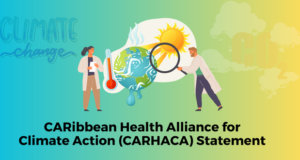Press Release: The Trinidad & Tobago Medical Association’s response to “Vitamin C more effective than flu vaccine.”
Dear Sir/Madam,
The Trinidad and Tobago Medical Association (T&TMA) writes in response to an article published in today’s Guardian newspaper entitled “Vitamin C more effective than flu vaccine”. We have consulted with various stakeholders including technical professionals at the Caribbean Public Health Agency (CARPHA), the Faculty of Medical Sciences UWI and the Paediatric Society of Trinidad and Tobago. Cases of influenza are on the rise and this trend is expected to continue and intensify during and after the carnival season, with the influx of tourists from countries where this virus is entering the seasonal peak of its circulation.
This illness contributes to significant morbidity and mortality, especially among susceptible groups (children, the elderly, diabetics and immune-compromised persons). The old adage ‘an ounce of prevention is worth a pound of cure’ holds water for approved immunisation programmes, inclusive of the influenza vaccine; and data regarding the safety of these vaccination programmes are available from reputable sources, including the Pan American Health Organisation (PAHO).
It is well documented that vaccinations for influenza and other vaccine
preventable diseases are safe, well tolerated and effective in the vast majority of the population. Vaccine adverse effects are rare; and the article in question fails to quantify how improbable and infrequent these side effects are, focusing instead on the potential range of rare events.
The Ministry of Health vaccination policy targets vulnerable groups (age less than five or greater than 65, diabetics, asthmatics and persons with immuno- suppressive conditions) who are at highest risk of adverse flu outcomes. Additionally, the Expanded Programme on Immunisation (EPI), at the Ministry of Health has mechanisms in place to collect data on adverse events, possibly attributable to vaccination. The current vaccine, GC-flu, has been purchased and distributed by the World Health Organisation since 2012, with no adverse issues or deaths attributed to its use in our population.
The benefits of the vaccine to those in the risk-groups outlined above, outweigh the risks alluded to in the article, and the selective strategy employed by the Ministry further reduces risk to the general population by vaccinating only those in greatest need, with the greatest potential benefits.
It is prudent therefore not to discourage the uptake of the vaccine by those who require its protection most; and to allow the EPI at the Ministry of Health to continue its good work in preventing unnecessary morbidity and mortality from Influenza.
Yours Respectfully,
Dr. Marisa Nimrod
Public Relations Officer
T&TMA 2018
For Dr. Chandra Saroop
President
T&TMA 2018
 T&T Medical Association
T&T Medical Association




